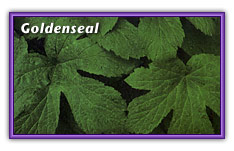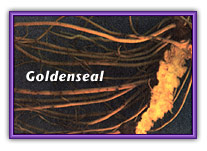 Source
Source
Goldenseal is the root and rhizome of a member of the buttercup family. It grows in rich woods from Vermont to Georgia, west to Alabama and Arkansas, north to eastern Iowa and Minnesota.
Traditional Use
The Cherokee used the roots topically to treat inflammations and drank a root tea to improve appetite and for dyspepsia. The Iroquois used it for liver disorders, fever, sour stomach, and diarrhea.
Goldenseal was listed among the official remedies in the first revision (1830) of the New York edition of the U. S. Pharmacopoeia. It was dropped in 1840, then listed again from 1860 to 1926. The root was used primarily for inflammations of the mucous membranes.
 Current Status
Current Status
Goldenseal is one of the more popular American herbs. It is used as an antiseptic, to stop bleeding, and as a tonic and anti-inflammatory for the mucous membranes. Components derived from the root have been used in eyewashes.
In the past century, very little scientific research has been done on goldenseal. Its major effects are attributed to the alkaloids hydrastine and berberine. In animal experiments, hydrastine lowered blood pressure; berberine stimulated digestion and the secretion of bile, lowered blood pressure, and inhibited growth of bacteria. Berberine gives goldenseal its yellow color and bitter taste.
One modern folk use of goldenseal is based on the plot of a 1900 novel by the pharmacist John Uri Lloyd, Stringtown on the Pike: ingesting the herb in an attempt to mask the presence of illicit drugs ill the urine. Although there is no scientific evidence to support this practice, some laboratories now test for goldenseal in urinalysis. Still widely used, goldenseal is a plant in need of new research.
Preparations
The whole and powdered dried root is available, as is the leaf, which contains some of the root alkaloids but in smaller concentrations. Capsules, tablets, tinctures, extracts, salves, and ointments are also available.
Cautions
Fresh goldenseal may cause ulcerations of the skin when applied externally; reports of this reaction relate to homeopathic remedies of the midnineteenth century which contained jimsonweed and zinc oxide in addition to goldenseal. No recent reports of toxicity occur in the literature. Several books warn pregnant and nursing women and people with heart problems to use goldenseal cautiously, presumably because of the lack of toxicity studies. While it has not been documented scientifically, goldenseal may disrupt intestinal flora; some herbalists therefore recommend taking acidophilus with it.
Symptoms
Inflammation of mucous membranes
Actions
Antibacterial

![]()
![]()
![]()
 Source
Source Current Status
Current Status